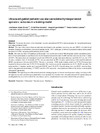Identificador persistente para citar o vincular este elemento:
https://accedacris.ulpgc.es/jspui/handle/10553/107272
| Título: | Ultrasound-guided pediatric vascular cannulation by inexperienced operators: outcomes in a training model | Autores/as: | López Álvarez, José Manuel Pérez Quevedo, Olivia Naya-Esteban, Joaquín Ramírez Lorenzo, Teresa Falcón-González, Juan Carlos Lorenzo-Villegas, Dionisio Lorenzo |
Clasificación UNESCO: | 32 Ciencias médicas 3212 Salud pública |
Palabras clave: | Paediatrics Simulation Ultrasound Vascular Access |
Fecha de publicación: | 2021 | Publicación seriada: | Journal of Ultrasound | Resumen: | Objective: To present the results of an ultrasound vascular cannulation (UGVC) training program for inexperienced operators using a training model. Method: This was a descriptive observational study developed in the paediatric intensive care unit (PICU) of a third-level hospital. Operators received basic theoretical training in the USVC technique, followed by practical training with a model designed for USVC-inexperienced healthcare professionals. Results: The study included 25 healthcare professionals, who carried out a total of 300 ultrasound-guided cannulation procedures (12 per participant) at equidistant sites on the longitudinal axis/in-plane (LA/IP) and the transverse axis/out-of-plane (TA/OP). The mean depth of cannulated vessels was 0.90 (0.34) cm and their mean diameter was 0.41 (0.1) cm. In 41.7% of cases, complete view of the needle (CVN) was accomplished; in 49% of cases, repositioning of the needle/guidewire (RNG) was necessary for successful UGVC. The rate of successful UGVC in the training model was 79.7%. The mean time required for the procedure was 74.70 (73.72) seconds. The time to successful cannulation was 58.72 (56.87) seconds. The mean number of attempts needed until successful UGVC was 1.31 (0.72). Complications were: (a) 26.3% vessel perforation/wrong guidewire positioning (VP/WGP) and (b) 4.3% successful vessel puncture followed by failure to accomplish subsequent cannulation. Conclusions: Through the present theoretical–practical training program for inexperienced operators using a training model: (a) high success rates and short procedural times were attained; (b) complete view of needle and need for repositioning the needle/guidewire occurred in half of the procedures; and (c) complications occurred in a third of the procedures. | URI: | https://accedacris.ulpgc.es/handle/10553/107272 | ISSN: | 1971-3495 | DOI: | 10.1007/s40477-021-00585-9 | Fuente: | Journal of Ultrasound [ISSN 1971-3495], n. 25, p. 199–205 |
| Colección: | Artículos |
Citas SCOPUSTM
1
actualizado el 08-jun-2025
Citas de WEB OF SCIENCETM
Citations
1
actualizado el 08-feb-2026
Visitas
220
actualizado el 15-ene-2026
Descargas
306
actualizado el 15-ene-2026
Google ScholarTM
Verifica
Altmetric
Comparte
Exporta metadatos
Los elementos en ULPGC accedaCRIS están protegidos por derechos de autor con todos los derechos reservados, a menos que se indique lo contrario.
